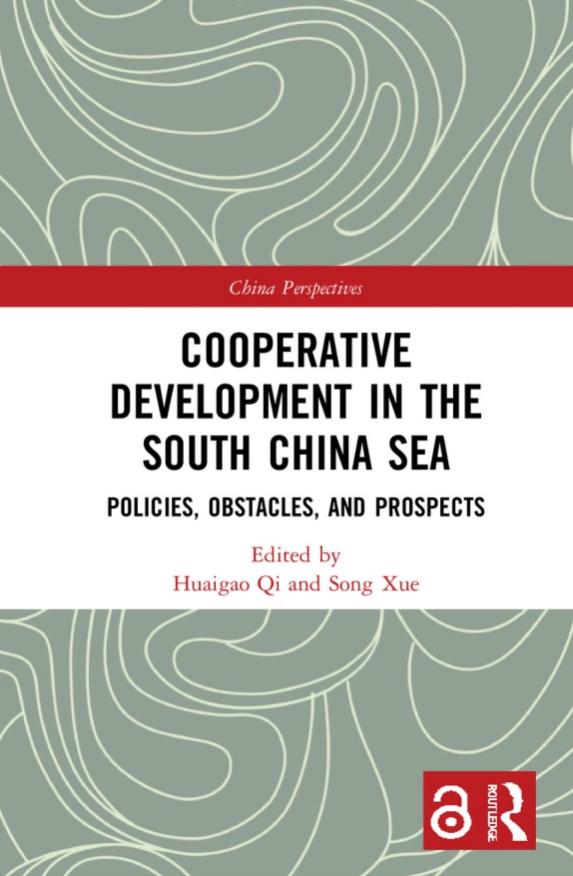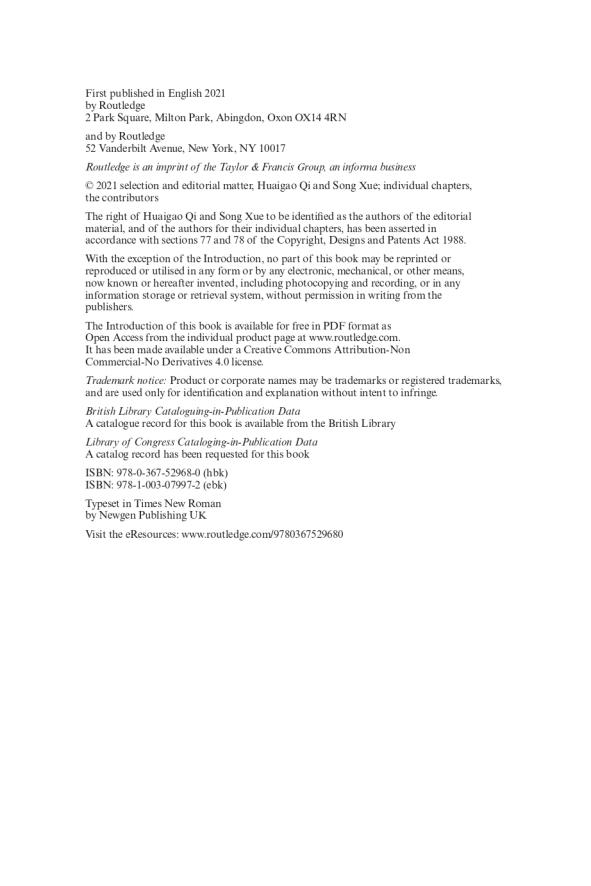QI Huaigao and XUE Song, eds., Cooperative Development in the South China Sea: Policies, Obstacles, and Prospects Qi, Huaigao, and Song Xue, eds. Cooperative Development in the South China Sea: Policies, Obstacles, and Prospects, London: Routledge, 2021. ISBN 9780367529680 eBook Published: October 2020 eBook ISBN:9781003079972 The title page of Cooperative Development in the South China Sea: Policies, Obstacles, and Prospects The copyright page of Cooperative Development in the South China Sea: Policies, Obstacles, and Prospects Content Introduction and Features The South China Sea dispute poses a long-term risk to regional peace and security in East and South-East Asia. When it is difficult to advance the delimitation of maritime areas between the disputing parties, ad hoc arrangements for the cooperative exploitation of natural resources in the disputed areas have become a more effective way to manage differences. Therefore, the littoral States of the South China Sea have agreed to cooperate in the form of ad hoc arrangements for the development of natural resources in order to achieve a win-win situation for all parties. The book “Cooperative Development in the South China Sea: Policies, Obstacles, and Prospects” includes insights from ten authors from six South China Sea littoral states (Brunei, China, Indonesia, Malaysia, the Philippines and Vietnam) and provides a comprehensive analysis of the motivations and policies for cooperative development in the South China Sea. The book also discusses bottlenecks in cooperative development and offers concrete policy recommendations. The book addresses the concerns about cooperative development in the South China Sea and illustrates innovative approaches to promote cooperation. FEATURES OF THE BOOK This book is written and published in English by a collaboration of scholars from the six South China Sea littoral states. They express the opinions of the littoral states to cooperative development in the South China Sea in a diversified and balanced way, both from the perspective of the South China Sea region as a whole and from the domestic political, economic and legal perspectives of each country. This book uses the more flexible and inclusive term "cooperative development" in its title and core concepts. "Cooperative development" (sometimes also referred to as "development cooperation") encompasses not only the joint development of disputed maritime areas, but also cooperation in the exploration and exploitation of hydrocarbons in non-disputed maritime areas. The distinction between "cooperative development" and "joint development" is not a "play on words". "Cooperative development" is a flexible and balanced concept when there is an absence of the clear and precise identification of overlapping claim areas. "Cooperative development" also accommodates the national motivations and policy arguments articulated by scholars from each of the six South China Sea littoral States in this book. Contents Introduction: Cooperative Development among the South China Sea Coastal States (QI Huaigao and XUE Song) ……1 1. From Joint Cooperation to Joint Development in the South China Sea: Incentives, Challenges, and Prospects for Brunei Darussalam(LIEW Jolene Hui Yun)……17 2. China’s Incentives and Policy Choices on Joint Development in the South China Sea (QI Huaigao)……31 3. Indonesian views of managing disputes through cooperation in the South China Sea and the obstacles(FITRIANI Evi)……47 4. Prospects for Sino–Malaysian joint development in the South China Sea: Lessons from Malaysia’s experiences(NGEOW Chow-Bing)……58 5. Philippines – China Joint Development Agreement in the South China Sea under Duterte(RABENA Aaron Jed)……77 6. Vietnam’s cooperative development in the South China Sea: Existing cases and policy suggestions(BUI THI Thu Hien)……97 7. The US approach to joint development in the South China Sea(HONG Nong)……117 8. Promoting business connectivity among industrial parks in the South China Sea rim and its vicinity(PRAMONO Siswo and NOVITA Bayu Rahmat)……130 9. Why joint development agreements fail: Implications for the South China Sea dispute(XUE Song)……155 10. Conclusion: Bringing political calculations back to cooperative development in the South China Sea(XUE Song, QI Huaigao)……174 About the author (in alphabetical order of surname) Dr. BUI THI Thu Hien is Deputy Director at the Center of East Sea Studies, Vietnam Institute of Chinese Studies at Vietnam Academy of Social Sciences. Her research areas are law and political science. Her publications include a recent chapter in China and Its Neighbourhood: Perspectives from India and Vietnam (2017). Dr. Evi Fitriani is Associate Professor of International Relations Department, Faculty of Social and Political Sciences, Universitas Indonesia and the Head of the Department from 2012 to 2016. Her latest publication is “Indonesian Perceptions of the rise of China”, the Pacific Review 2018. Dr. HONG Nong is Executive Director and Senior Fellow of Institute for China–America Studies. Her selected publications include China’s Role in the Arctic: Observing and Being Observed (London and New York: Routledge, 2020), UNCLOS and Ocean Dispute Settlement: Law and Politics in the South China Sea (Routledge, 2012). Ms. Jolene Hui Yun LIEW holds a MA in International Politics from Fudan University, where she specialized in Chinese Politics and Diplomacy. Her major research interests include small-state alignment strategies, regional security and Sino-US power interaction in Southeast Asia. Mr. Bayu Rahmat Novita, S.IP, MProfStuds, is the Head of Subdivision for the East Asia Study, Center for Analysis and Development for Asia-Pacific and Africa regions, Policy Analysis and Development Agency (PADA), Indonesian Ministry of Foreign Affairs (MoFA). His main research interest includes regionalism with particular emphasis on East and South Asia, global political economy, and norms in international relations. Dr. NGEOW Chow-Bing is Director at the Institute of China Studies, University of Malaya. His research interests are Chinese politics and China-Southeast Asia relations. He received his PhD in Public and International Affairs from Northeastern University. Dr. Siswo Pramono, LL.M is the Director General/Head of the Policy Analysis and Development Agency (PADA) at the Ministry of Foreign Affairs (MoFA) of the Republic of Indonesia. His main research interest includes international political economy, connectivity and sustainability. Dr. QI Huaigao is Associate Professor and Vice Dean at the Institute of International Studies, Fudan University. His research interests are China’s neighboring diplomacy, China’s ocean affairs, and Asia-Pacific international relations. He has published several books on China’s foreign policy and on the Belt and Road Initiative. Dr. Aaron Jed Rabena is Research Fellow at Asia-Pacific Pathways to Progress (a Manila-based foreign policy think tank), Consultant at Caucus Incorporated (a business and government relations consulting firm), and Member of the Philippine Council for Foreign Relations (PCFR). Dr. Song XUE is Assistant Professor of Institute of International Studies, Fudan University. Her research focuses on Indonesian politics and foreign relations, ethnic studies and China-ASEAN relations. Her researches were published in Contemporary Southeast Asia, Asian Ethnicity and journals in Chinese. Acknowledgment The book is derived from the half-day panel discussion titled “Joint Development in the South China Sea,” a Roundtable of the 2019 Shanghai Forum held on 26 May 2019, at Fudan University. The book is not possible without the help, advice and support of many people and organizations. We would like to thank the anonymous reviewers, Ms. Sun Lian and Ms. Jing Ying of Taylor & Francis. We would also like to thank Center for China’s Relations with Neighboring Countries of Fudan University (CCRNC-Fudan) and Network of ASEAN-China Academic Institutes (NACAI) for providing research networks. We would like to extend our gratitude to Dr. Sun Tao at Center for Historical Geographical Studies of Fudan University who helped make Figure 0-2. The panel discussion and the book are funded by Shanghai Municipal Education Commission under the University Think-Tank of Shanghai 2019 Program titled “How to Clear Bottlenecks of the Joint Development in the South China Sea.”(No:2019-1-2-44) For more information on the book, see: https://www.routledge.com/Cooperative-Development-in-the-South-China-Sea-Policies-Obstacles-and/Qi-Xue/p/book/9780367529680 DOI: https://doi.org/10.4324/9781003079972 Link to the Chinese version: http://www.iis.fudan.edu.cn/d1/4f/c6849a250191/page.htm

Qi Huaigao and Xue Song, eds., Cooperative Development in the South China Sea: Policies, Obstacles, and Prospects
发布时间:
2020-10-29
访问次数:
319
